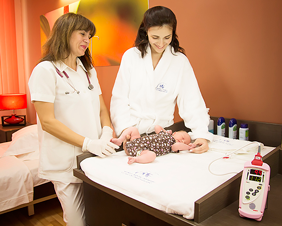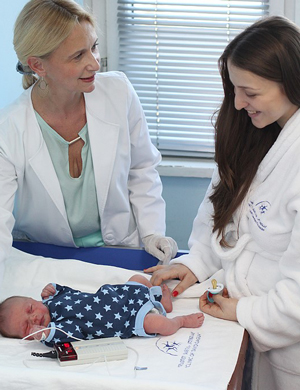
The Rostropovich-Vishnevskaya Foundation (RVF), in cooperation with the Georgian Ministry of Labor, Health & Social Development (MLHSD) and with the support of the US Department of State, launched a pilot program to screen all newborns in the Georgian capital of Tbilisi for life-threatening critical congenital heart defects in June 2014. The program has how been expanded to include the cities of Batumi and Kutaisi.
The WHO estimates that each year, 270,000 newborns die during the first 28 days of life from congenital anomalies. Critical congenital heart defects (CCHDs) are one of the most common severe malformations in the world. In the Republic of Georgia more than 1,000 babies are born each year with potentially fatal heart defects. Many babies born with CCHDs appear healthy at birth, only to develop acute deterioration and die several days after leaving their birth hospitals.
This program uses pulse oximetery, which provide a safe and non-invasive method to detect potential critical congenital heart defects in newborns. Most babies born with a CCHD can be stabilized and successfully treated if diagnosed in the first 24-48 hours of life. This program provides the missing diagnostic screening component so that newborns are referred in a timely manner to the existing medical and surgical treatment capability in Tbilisi.

Since June 2014, over 76,500 infants have been screened and 41 with CCHDs and 166 with other heart defects have been identified. All babies with confirmed heart defects received immediate emergency treatment free of charge at the Jo Ann Cardiovascular Center in Tbilisi. All of the babies have survived.
In March 2015, RVF launched a crowdfunding campaign with GlobalGiving to strengthen and expand this life-saving heart screening program for babies in Georgia. The funds generously donated through GlobalGiving have allowed the purchase of 25 new pulse oximeters and additional training for physicians and healthcare workers. All 21 maternity centers in Tbilisi are now supplied with these state-of-the-art devices, which will help strengthen the screening program in Tbilisi. The new pulse oximeters bring greater sensitivity to the screening process and it is expected that the number of newborns diagnosed with critical congenital heart defects may increase by as much as 50%.
In August 2017, RVF with the support from Charitable Fund Cartu donated 45 new pulse oximeters for the hospitals in Tbilisi, Batumi and Kutaisi. Three transport incubators with artificial respiratory device were donated to the Emergency Situations Coordination and Urgent Assistance Center of Ministry of Labour, Health and Social Affairs to help ensure effective implementation of newborn referrals. The service will be available in Tbilisi, Batumi and Kutaisi. Vehicles will be sent to nearby regions when needed.
In June 2017, RVF Representatives met with US Ambassador to Georgia Nathan Kelly to celebrate the RVF’s 25th anniversary and the US Government’s long history of supporting RVF programs.
In November 2015, RVF President Elena Rostropovich and and members of RVF’s Board of Directors met with a number of Georgian leaders including Georgian Patriarch Ilya II, Georgian Prime Minister Irakli Garibashvili, Georgian Vice Prime Minister, Foreign Minister Giorgi Kvirikashvili and and the President of Georgia, Giorgi Margvelashvili to discuss past, present and future RVF programs in Georgia, including scaling up RVF’s CCHD newborn screening program.
In October 2014, RVF staff met with Minister of Labour, Health and Social Services Davit Sergeenko, who agreed to support the implementation of RVF’s programming in Georgia.
This program builds the capacity of health care workers in Tbilisi by providing training in modern pediatric cardiology. The state-of-the art capacity developed in the capital will serve as the basis for extending the benefits of this program to other urban centers and eventually the entire country, thus benefiting the entire birth cohort of Georgia – approximately 50,000 infants.
RVF plans to scale up this pilot screening program to a nationwide program that will be sustained by the Government of Georgia.